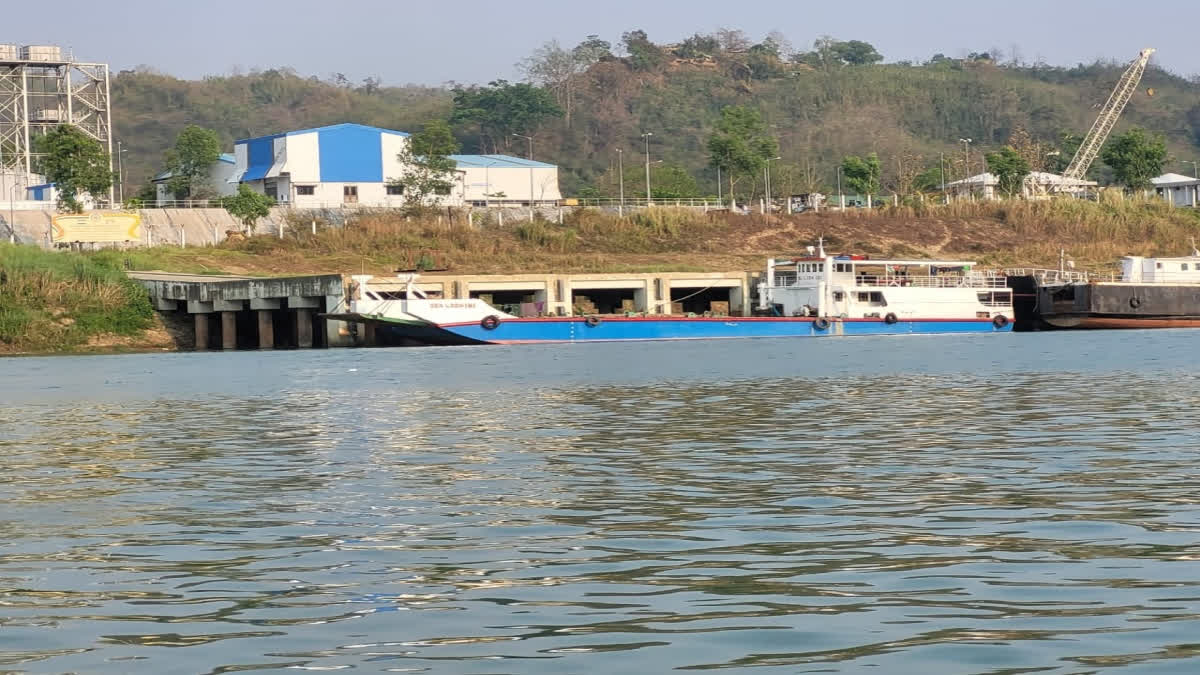New Delhi: With work on the crucial Kaladan Multimodal Transit Transport Project (KMTTP) getting stalled due to the conflict between Myanmar’s resistance forces and the military junta intensifying, India is now playing a delicate balancing game to protect its interests in the eastern neighbour.
The KMTTP connects the port of Haldia in West Bengal with the port of Sittwe in Myanmar that was built with funding from India. The corridor then links Sittwe with Paletwa town in Chin State of Myanmar via the Kaladan river boat route. Paletwa is then linked with Mizoram by road. All components of the project, including the Sittwe port, have been completed, except the under-construction Zorinpui-Paletwa road.
Union Minister for Ports, Shipping and Waterways Sarbananda Sonowal and Deputy Prime Minister and Union Minister for Transport and Communications of Myanmar Admiral Tin Aung San had jointly inaugurated the Sittwe port in the Rakhine State of Myanmar in May last year.
However, according to reports, the port in Sittwe, the capital of Rakhine State, is now under the control of the Tatmadaw or the Myanmar army while Paletwa town is under the control of the ethnic-Rakhine Arakan Army resistance group. The Arakan Army is part of the Three Brotherhood Alliance that launched Operation 1027 against Myanmar’s military junta in October last year. The Myanmar National Democratic Alliance Army (MNDAA) and Ta’ang National Liberation Army (TNLA) are the other two resistance groups comprising the Three Brotherhood Alliance.
“Work on the Kaladan project is not progressing at all,” Mr Kim, a Myanmarese political activist, told ETV Bharat over phone from somewhere along the Mizoram-Myanmar border. “Paletwa is under total control of the Arakan Army which is now in the process of building up its own administration.”
At the same time, he said that border trade is going on between Mizoram and Chin State in Myanmar. “India is allowing the supply of essential commodities to the Arakanese people in Chin State,” Mr Kim said. “These include sugar, mustard oil, peanut oil, biscuits, medicines and petrol. For this, the Arakan Army is appreciative of the Government of India.”
In fact, earlier this year, K Vanlalvena, the lone Rajya Sabha member from Mizoram, met rebels of the Arakan Army across the border in Myanmar to take stock of the Kaladan project. He also met officers of the construction company IRCON, and Indian PSU. According to a Mizoram government press release, during his meeting with IRCON and its two Myanmar sub-contractors, Vanlalvena expressed his disappointment at the slow progress of work on the Kaladan project. He urged IRCON and its sub-contractors to speed up the work.
Pointing out that India is engaging with both sides of the conflict, Mr Kim said that New Delhi also has good relations with junta leader Min Aung Hlaing. In fact outgoing Indian Ambassador to Myanmar Vinay Kumar held a meeting with Min Aung Hlaing on March 29 and discussed cooperation between India and Myanmar.
According to the news website Mizzima, ahead of his departure from Myanmar after being appointed as India’s new Ambassador to Russia, Vinay Kumar also donated medicines and medical supplies to the Director of Medical Services Maj. Gen. Ko Ko Lwin, for the 1,000-bed Tatmadaw Military Hospital in Naypyitaw. Amongst the medical donations were two Aarogya Maitri Cubes, and a modular ‘flatpack’ field hospital that can be delivered by helicopter and assembled faster than flatpack furniture. The hospital is contained in 72 small waterproof cubes, each weighing less than 15 kg. These are packed with tents and specially designed medical equipment such as a mini-ICU, an operation theatre, cooking station, food, water, a power generator, blood test equipment and an X-ray machine.
According to K Yhome, Fellow at the Shillong-based think tank Asian Confluence, India is engaging in a balancing act to protect its strategic and security interests.
“It’s a two-pronged strategy where the Government of India is trying to engage with all parties in the conflict in Myanmar to minimise any undesired consequences,” Yhome said. “This will also ensure that there are channels of communication with both sides of the conflict. This engagement has been going on for decades now.”
Myanmar presents a complex political situation not only for India but also for all neighbouring countries. India is building these multiple relationships to buffer against unintended consequences of the conflict.
According to Yhome, as far as the Kaladan project is concerned, it has been facing severe security challenges not only because of the 2021 military coup that ousted the democratically elected government of Nobel laureate Aung San Suu Kyi.
“These security challenges have been there ever since the junta and the Arakan Army started fighting in Rakhine State,” he said. Founded on April 10, 2009, the Arakan Army is the military wing of the United League of Arakan (ULA). Based in Rakhine State, this ethnic armed organisation is currently led by commander-in-chief Twan Mrat Naing and vice deputy commander-in-chief Nyo Twan Awng. The Arakan Army states that the objective of its armed revolution is to restore the sovereignty of the Arakan people.
The Arakan Army was trained by the Kachin rebels in Kachin State. The Kachins also have ties with China. China has huge interest in infrastructure in Myanmar because of its geostrategic location. While China wants to leverage the central government of Myanmar, it uses the ethnic armed organisations as pressure groups. Beijing wants to ensure that its pipelines passing through ethnic armed organisations-dominated areas have some sort of guarantee.
“The area through which the Kaladan project passes is dominated by the Arakan Army,” Yhome said. “So, India is dependent on the Arakan Army. As such, New Delhi is playing a balancing game.”



